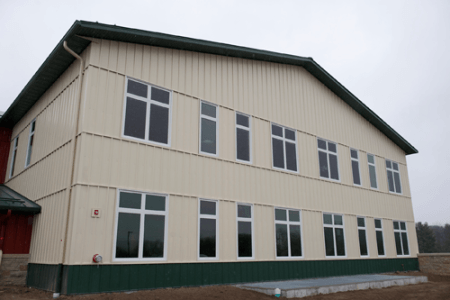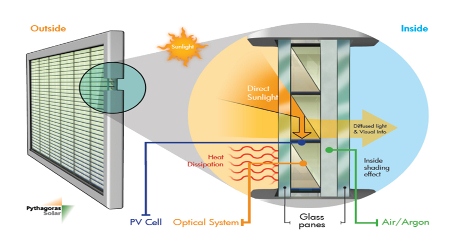Organic Valley is America’s largest cooperative of organic farmers, representing 1,687 farmers in 35 states and three Canadian provinces. The co-op has been helping to save family farms since 1988 by transitioning them to organic growing practices, and helping them market their products through a common brand. Today, its organic milk, soy, cheese, butter, spreads, creams, eggs, produce and juice can be found in supermarkets and natural foods stores across North America.
Now, Organic Valley has taken steps to reduce its own carbon footprint—by installing solar windows at its headquarters in La Farge, Wis. The facility’s 20 solar windows, manufactured by Pythagoras Solar, are designed to simultaneously optimize daylighting to improve the building’s energy efficiency, while producing solar power. The windows reduce glare, enabling Organic Valley employees to turn off artificial lights and work under more natural light during the day. With less heat entering the building, Organic Valley says the the solar windows also help reduce the building’s cooling load, and “create a more comfortable and productive work environment.”

“With these solar windows we plan to save energy and generate power at the same time, a positive contribution to meeting our overall operational sustainability goals,” said Cecil Wright, vice president of Sustainability and Local Operations at Organic Valley. “By adopting these innovative windows, we are also helping to pave the way for this technology, which has the merit to become a standard in the design and construction of net zero energy buildings.”
Pythagoras Solar’s Photovoltaic Glass Unit (PVGU) is a double-paned glass window with an interior optical system adhered to the inner surface of the outer glass pane consisting—not coincidentally—of right triangles. The optical system is designed to separate light according to the angle at which it hits the glass, concentrating all direct sunlight onto PV cells mounted perpendicular to the glass panes. Diffused light is allowed to pass through an air/argon barrier; heat is dissipated outside. PVGU is also designed to be integrated easily with conventional buildings.

According to Pythagoras Solar, PVGU technology is different from other BIPV technologies, which can suffer from low power conversion efficiencies, low light transmission and poor aesthetics. A standard PVGU window is rated at 120 watts, and has an efficiency of 12 percent; but the windows can be custom-made to meet the needs of building.
With offices in San Mateo, Calif., Israel and Taiwan, Pythagoras is looking to revolutionize the building-integrated PV market (BIPV). The company was a winner of GE’s ecomagination challenge last year, and was also selected for a pilot project to install PVGUs on the south-facing exterior of the Willis (formerly, Sears) Tower.